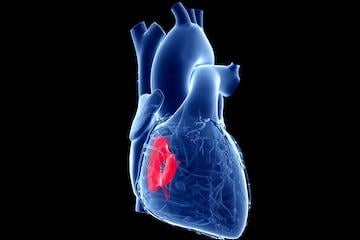
In tricuspid valve regurgitation, a complex condition that Cedars-Sinai experts regularly treat, the valve between two heart chambers on the right side doesn't open or close properly. Image by Getty.
Feb. 13, 2025 — Research from Cedars-Sinai investigators and collaborators at other leading medical institutions is helping to provide more treatment options to people living with tricuspid valve disease..
Traditionally, cardiothoracic surgeons have repaired or replaced the tricuspid valve during open-heart surgery and only when absolutely necessary; such surgeries are complex and risky. Now, an increasing number of studies show that cardiac interventionalists can successfully use minimally invasive catheter-based techniques. Catheter-based procedures offer an alternative for patients who are not candidates for open-heart surgery.
Raj Makkar, MD, vice president of Cardiovascular Innovation and Intervention and the director of the Karsh Division of Interventional Cardiology in the Smidt Heart Institute at Cedars-Sinai, and his team of experts treat more than 10,000 patients every year. Makkar explained the advances for patients with tricuspid valve disease in a conversation with the Cedars-Sinai Newsroom.
CSN: What is tricuspid regurgitation, and who does it affect?
Raj Makkar, MD: Tricuspid regurgitation is a condition where the tricuspid valve fails to close properly, allowing blood to flow backward into the right atrium. Studies estimate that severe regurgitation occurs in up to 4% of individuals 75 and older and is often linked with conditions like heart failure, atrial fibrillation or pulmonary hypertension. Women are more frequently affected, and because the condition often develops slowly, many patients are diagnosed at advanced stages when symptoms like swelling, fatigue and breathlessness impact them.
How has treatment for tricuspid valve disease evolved?
Makkar: For decades, tricuspid regurgitation was largely overlooked, often addressed only during surgeries for other heart valves. Today, advances in minimally invasive treatments like transcatheter edge-to-edge repair (TEER) and transcatheter tricuspid valve replacement (TTVR) are providing new hope. These innovative procedures offer safe and effective options for high-risk patients who previously had limited or no treatment alternatives, focusing on enhancing quality of life.
Cedars-Sinai investigators, in collaboration with colleagues from other leading institutions, recently conducted a clinical trial involving patients with severe tricuspid regurgitation. The study, published in the New England Journal of Medicine, found that patients who underwent catheter-based tricuspid valve replacement combined with medical therapy reported significantly greater improvements in symptoms and quality of life compared with those receiving medical therapy alone. These findings mark a significant step forward in the treatment of this historically neglected condition.
When might a minimally invasive procedure be the best approach?
Makkar: Minimally invasive procedures for the tricuspid valve are generally the only option for older or frail patients, who are unable to withstand traditional open-heart surgery. A TEER procedure, which inserts clips in the valve to reduce leakage, works well for many, but is less effective for those with complex valve anatomy. In such cases, TTVR, which replaces the valve entirely, may be a better option.
How do you discuss options with patients?
Makkar: At the Smidt Heart Institute, physicians discuss the case as a group and review imaging findings and other information to determine whether a transcatheter procedure, minimally invasive surgery, medical intervention alone or a clinical trial is best for each patient.
Selecting the right treatment involves careful evaluation of the patient’s health, anatomy and goals. We prioritize improving quality of life, particularly for patients experiencing severe fatigue and breathlessness.
Disclosures: Dr. Makkar reports research grants from Edwards Lifesciences, Abbott Vascular, Boston Scientific, JenaValve and Medtronic; he has received travel support from Edwards Lifesciences, JenaValve, Abbott Vascular and Boston Scientific.
|


 December 24, 2025
December 24, 2025 









